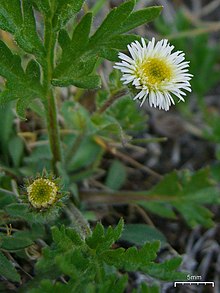| Erigeron pallens | |
|---|---|

| |
|
Scientific classification
| |
| Kingdom: | Plantae |
| Clade: | Tracheophytes |
| Clade: | Angiosperms |
| Clade: | Eudicots |
| Clade: | Asterids |
| Order: | Asterales |
| Family: | Asteraceae |
| Genus: | Erigeron |
| Species: | E. pallens
|
| Binomial name | |
| Erigeron pallens | |
| Synonyms [1] | |
| |
Erigeron pallens is a species of flowering plant in the family Asteraceae known by the common name pale fleabane. [2] It is native to the Rocky Mountains of western Canada ( Alberta + British Columbia). [3] There are some reports of the species in arctic regions but these populations have been reclassified under other species. [2]
Erigeron pallens is a tiny, unbranching perennial herb rarely more than 10 centimeters (4 inches) tall, producing a woody taproot. The leaves are covered with wool. The plant generally produces only 1 flower head per stem, each head with 50–60 white, pink, or purple ray florets surrounding numerous yellow disc florets. The plant grows on rocky slopes in sparsely vegetated slopes. [2]
References
| Erigeron pallens | |
|---|---|

| |
|
Scientific classification
| |
| Kingdom: | Plantae |
| Clade: | Tracheophytes |
| Clade: | Angiosperms |
| Clade: | Eudicots |
| Clade: | Asterids |
| Order: | Asterales |
| Family: | Asteraceae |
| Genus: | Erigeron |
| Species: | E. pallens
|
| Binomial name | |
| Erigeron pallens | |
| Synonyms [1] | |
| |
Erigeron pallens is a species of flowering plant in the family Asteraceae known by the common name pale fleabane. [2] It is native to the Rocky Mountains of western Canada ( Alberta + British Columbia). [3] There are some reports of the species in arctic regions but these populations have been reclassified under other species. [2]
Erigeron pallens is a tiny, unbranching perennial herb rarely more than 10 centimeters (4 inches) tall, producing a woody taproot. The leaves are covered with wool. The plant generally produces only 1 flower head per stem, each head with 50–60 white, pink, or purple ray florets surrounding numerous yellow disc florets. The plant grows on rocky slopes in sparsely vegetated slopes. [2]
References